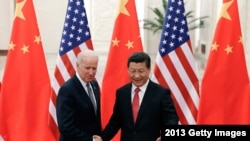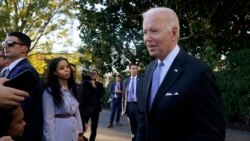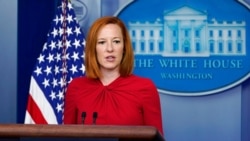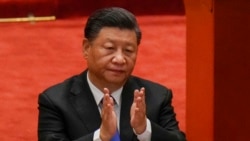Monday’s virtual meeting between President Joe Biden and Chinese President Xi Jinping is their first face-to-face, president-to-president encounter since Biden took office: The two spoke by phone in February and September, and then-Vice President Biden met in person with then-Vice President Xi nearly a decade ago.
As these two very different men face off virtually, they are expected to discuss several weighty topics including cybersecurity, trade, nuclear non-proliferation, and the status of Taiwan.
The White House has downplayed this historic encounter, calling it a “meeting” instead of a “summit.” And analysts say they expect few, if any, concrete commitments to come of their anticipated three-hour talk Monday night.
That may be, analysts say, because each leader appears to be coming in strong with deeply held positions, entrenched personalities, and contrary strategies -- all of which will, in effect, likely maintain the current status quo.
Biden’s Strategy
Historian Jeremi Suri said, despite the low expectations, this is an historic opportunity for both men. Biden, like his predecessors, is coming in with a clear strategy.
“This meeting between Xi Jinping and Joe Biden, his virtual meeting, is on a scale with Nixon's visit to China in the early 1970s, Carter and Reagan and Bush and their interactions as we opened our relations with China in the late 70s, and 1980s,” said Suri, a professor at the University of Texas at Austin.
“And it's as important as the meetings that occurred after Tiananmen in late 1989. In all of these meetings that I've mentioned, the president of the United States is doing two things. First, he's trying to understand where China is going at a moment of great change. Is China going in a more belligerent direction? Is it going in a more international, cooperative direction,” Suri told VOA. “So, there's the assessment of the foreign leader that the president is undertaking. And then second, there's a very important imagery of this for the public around the world. Can these two countries work together? Is it possible for us to resolve our differences? Or are we headed, as some fear, toward more and more conflict?”
The two countries’ economies have grown more deeply intertwined to their mutual economic benefit, but in recent years their political relationship has become more strained.
Disagreements over China’s trade practices and corporate espionage led to deeper rifts during the Trump administration which were worsened by arguments over the origin of the coronavirus pandemic.Earlier this year, U.S. Secretary of State Blinken admitted he sees “increasingly adversarial” aspects to the two countries’ relationship.
White House Press Secretary Jen Psaki said Biden will not shy away from frank conversations.
“Throughout, President Biden will make clear U.S. intentions and priorities and be clear and candid about our concerns with the PRC,” she said.
Biden himself has struck a gentler tone.
“I’ve made it clear: This does — this is competition; it does not have to be conflict,” he said last month. “There is no reason there needs to be conflict.”
Xi’s Strategy
Analysts say that Xi is looking to convince Biden to ease the diplomatic and economic pressure the United States has put on China. But as importantly, Suri said, Xi is looking to affirm his standing as a powerful figure on the world stage as he faces political pressure at home.
“I think the Chinese leader will be evasive,” he said. “I think Xi Jinping will not be direct. I think his approach with foreign meetings has generally been to present a very limited set of issues and to avoid conflict but also to avoid agreement he will try to show his people at home that he is an equal to the American president and that he can come into this meeting have serious discussions, but not come out having given any concessions at all.”
Robert Daly, the director of the Wilson Center's Kissinger Institute on China and the United States, says the two will need to find a way to manage their differences.
“Both sides would like to avoid conflict,” he said. “But neither side is willing to back down or change its goals. And some of those goals and interests are simply incompatible, especially in the western Pacific. So, the leaders are searching for some sort of formula that meets each other's minimal goals that will allow them to try to manage this competition, rather than have it escalate to conflict. We don't yet know what that is.”
Punch-Counterpunch
Both men have thrown punches into the air before this meeting, with Biden jabbing at Xi’s decision to not attend a major United Nations climate conference, saying: “they’ve lost an ability to influence people around the world.” Xi has not set foot out of China in nearly two years.
And China has counterpunched, with Xi’s foreign minister warning his counterpart ahead of talks that Biden should “stop sending wrong signals to the ‘Taiwan independence’ forces.”
This is a delicate dance, said Suri.
For Biden, he said, “there will be red lines that he will try to draw and he will mix carrots and sticks.”
Daly notes that the two men are equally embattled domestically, which puts them in a relatively even position. That, he says, bodes well for compromise.
“Neither man, in my view, is in a position of strength vis a vis the other right now, they're pretty equally balanced,” he said. “And that's probably a good thing; that probably will help them manage this very competitive relationship as well as possible.”
Jennifer Bouey, a Georgetown University professor and Tang Chair in China Policy Studies at the RAND Corporation, said there are opportunities for common ground, in fighting the pandemic and on climate change. Regardless, she said, the fact that they are both willing to meet at all is a positive step forward.
“There might be many places, many issues that will have conflicts, but starting the conversation, starting the dialogue, I think it's the best solution,” she said.
Patsy Widakuswara contributed to this report.







